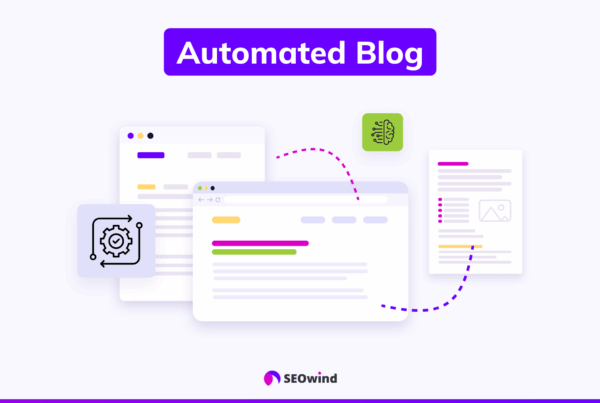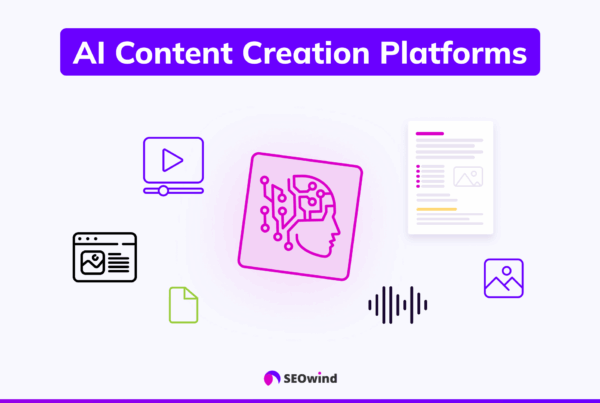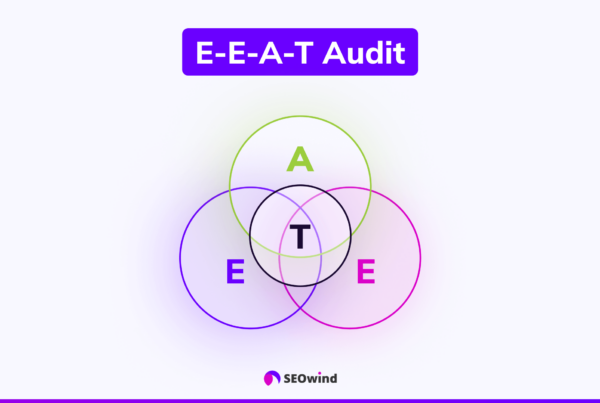Everywhere you look, it’s evident that Artificial Intelligence (AI) is reshaping the world around us. But have you ever considered the role of AI in your website’s search engine optimization (SEO)? What about the magic behind an automated SEO platform? In this article, I’ll reveal a secret weapon: the Master AI SEO Strategy. Our guide offers practical examples that clearly explain how AI revolutionizes old-school SEO tactics to drive more traffic while letting your page dominate rankings.
What is AI SEO Strategy?
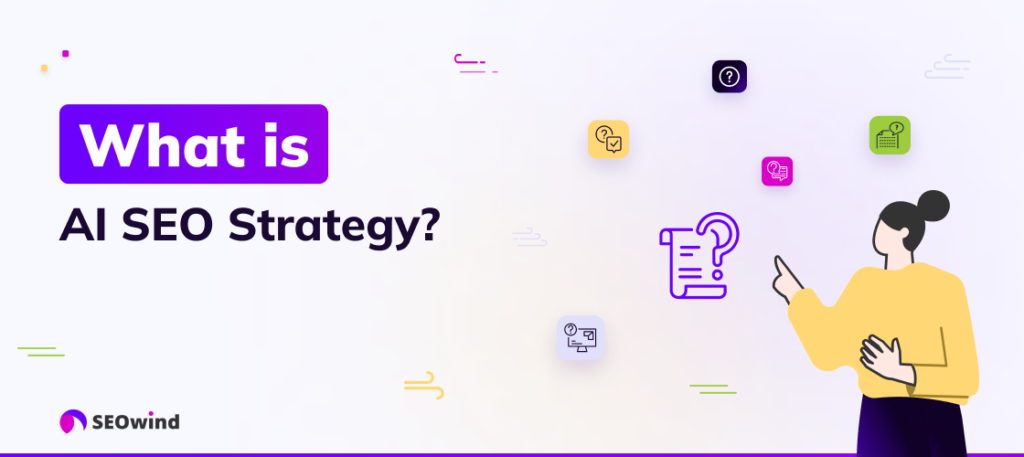
AI SEO strategy refers to using Artificial Intelligence to boost your website’s visibility on search engines like Google or Bing. Leveraging machine learning algorithms and data analysis prowess inherent in AI systems makes laborious manual processes seamless. This approach enables personalized content creation for better user engagement and higher ranking potential.
Can SEO be done with AI?
Indeed! Traditional methods of keyword stuffing are passé. Instead, we find ourselves in an age where Artificial Intelligence SEO reigns supreme. With advancements in natural language processing and machine learning capabilities fueling AI SEO platforms, repetitive tasks such as keyword research and tracking changes in algorithm updates can be efficiently automated.
Importance of AI in SEO strategy
Incorporating AI into your SEO strategy isn’t optional anymore. More than mere tools to automate routine jobs, these solutions accurately predict what type of content resonates with specific users, thus personalizing their experience considerably, a factor Google loves when “awarding” ranks!
Moreover, Artificial Intelligence in SEO broadens opportunities for getting backlinks while reducing bounce rates by providing relevant, engaging information that fulfills search intent.
Growth of AI in the field of SEO
AI’s adoption for SEO has been rapidly amplified as technologies such as machine learning converge to form smarter analysis tools. As a result, businesses can now interpret massive data sets faster to generate comprehensive insights about their audience and tweak strategies based on these findings.
Moreover, developers have designed incredible AI-powered SEO software that offers simplified analytics, performance predictions, and helpful content recommendations. These solutions steer us towards an undisputable fact: AI is not only for tech bigwigs. It dramatically transforms the very essence of running an online business for everyone!
Now, let’s explore how we harness this genie for SEO tasks.
How AI is Used in SEO
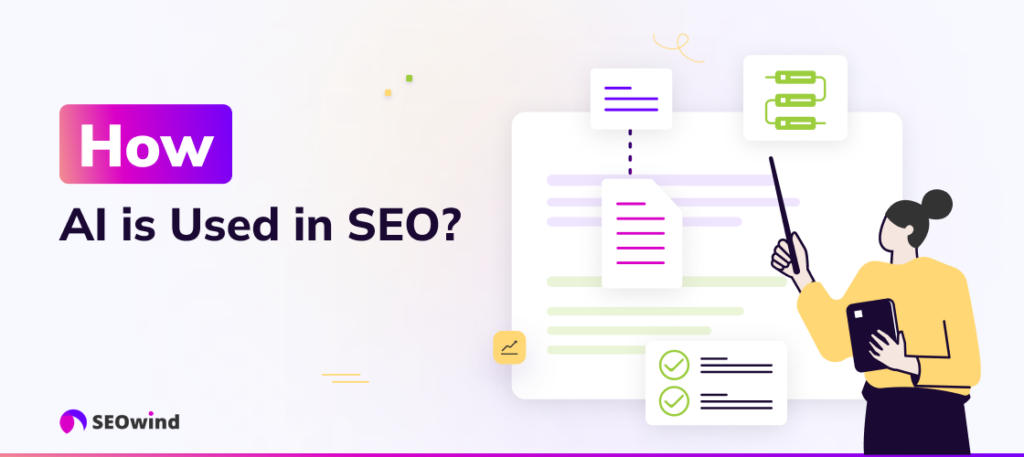
SEO has undergone a significant metamorphosis with the integration of Artificial Intelligence. Machine learning and AI are instrumental in revamping traditional methods and producing more effective strategies that deliver prolific results.
Automation of Tasks with AI
AI automates numerous facets of SEO, freeing up human capital to focus on strategic planning and creative work instead. Here’s how automation becomes a reality through AI:
- Metadata and Tags: Creating meta tags, titles, and descriptions can be time-consuming. Machine learning algorithms generate these elements automatically based on your content, ensuring relevancy and optimizing them for search engines.
- Writing SEO-optimized Content: If you get it right initially, you will get the results quicker. With tools like SEOwind, you write AI content based on deep content and keyword analysis, with a comprehensive outline based on what ranks and matching keywords.
- Content optimization: Even when you have spent countless hours perfecting your content, it might not resonate perfectly with Google’s continually evolving algorithms. SEO AI tools like Frase or MarketMuse measure content relevancy against high-performing websites in the same area.
This level of automation streamlines previously tedious tasks while maintaining high standards for SEO performance.
Data Analysis and Optimization with AI Algorithms
SEO isn’t just about attracting traffic. It’s about drawing in the right traffic. That means understanding precisely what appeals to your target audience and how they behave online. This is where data analysis makes an impact.
A typical digital marketer can analyze small data sets manually. Conversely, bigger data sets necessitate analytics tools infused with machine learning capabilities for precise interpretations. For example,
- An Artificial Intelligence SEO tool like BrightEdge uses patented machine learning algorithms to review site performance against 100 variables related to site structure, backlinks, profile competitor behavior, etc.
- A/B testing no longer involves impulsively forming hypotheses. Rigorous tests run by AI-powered SEO software like RankScience help discern which tweaks significantly improve SERP (Search Engine Results Pages) rankings.
AI helps derive actionable insight from massive amounts of data faster than a human could, making data-driven SEO a practical reality.
Predictive Modeling for Keyword Research and Content Creation
In the primitive days of SEO, keywords were utilized based on sheer guesswork. This gamble is being replaced with predictive modeling enabled by Artificial Intelligence in SEO. AI has democratized access to keyword forecasting that previously only big corporations could afford.
Neil Patel’s keyword tool Ubersuggest now uses a neural network model to predict future search volumes of certain keywords. Moreover, Clearscope uses natural language processing (NLP) models to fetch content ideas that best resonate with Google’s recent Core Web Vitals metrics.
AI brings unprecedented precision and clarity into the Wild West of keyword research and content ideation, transforming how we lay the groundwork for our SEO endeavors.
Benefits of AI SEO Strategy
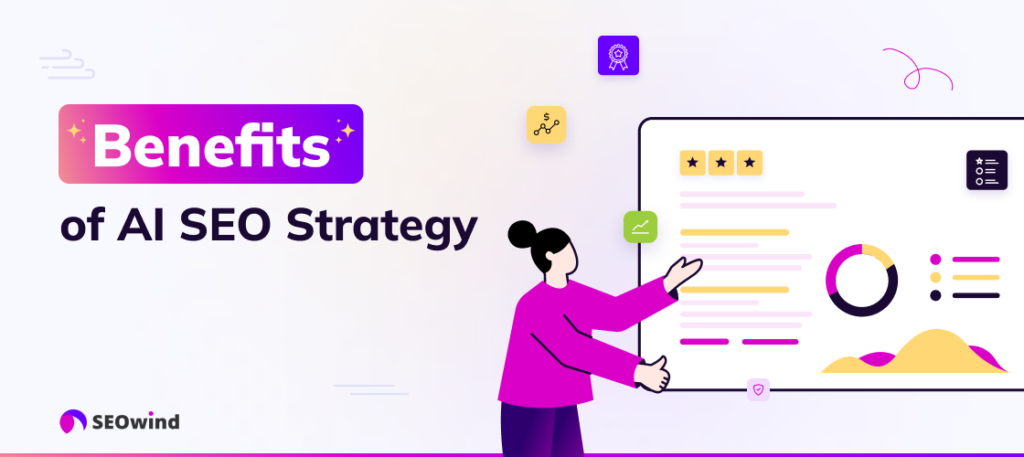
Shifting towards an AI-driven SEO strategy offers numerous advantages, especially in terms of efficiency gains and improved targeting. Leveraging Artificial Intelligence for SEO is not simply about keeping up with technological trends. It presents a substantial opportunity to refine and enhance your marketing strategies.
Increased Efficiency and Time Saving
Applying AI in your SEO strategy can significantly magnify your team’s productivity. These solutions excel at automating repetitive tasks like data collection, crawling URLs, and analyzing and optimizing metadata. By leveraging the power of automated SEO platforms, you can spare human resources from tedious work that would have otherwise taken countless hours. Consequently, these time savings allow more space for strategic thinking, such as planning high-level marketing tactics or creating creative content.
AI’s capability to streamline operational workflows also contributes to significant efficiency gains. For instance, using machine learning in SEO helps gather key insights quickly from vast datasets, which would take conventional manual methods much longer. This acceleration lets you promptly respond to changes in search algorithms or market trends, giving you the edge over competitors that rely on traditional methods.
Improved Targeting and Keyword Research
Artificial Intelligence also plays a crucial role in enhancing targeting accuracy in keyword research, one of the most critical facets of a successful SEO strategy. With advancements like Google’s BERT algorithm update, which utilizes NLP, search engine queries are better understood contextually rather than merely stringing together words. This evolution means that we need to shift from focusing solely on master keywords to involving broader topics and semantically related phrases.
Here’s where the value addition by AI becomes evident: machine learning-powered tools can efficiently analyze user patterns, behaviors, semantics, and sentiments far beyond what humans may discern from surface observations. They factor in vital dynamics like seasonality effects, user location, device used, and more while determining optimal keywords. This provides more accurate, contextually relevant keyword suggestions. The result? Your content is laser-focused to target your desired audience, which in turn bolsters user engagement.
Enhanced User Experience and Personalization
AI’s role in enhancing the user experience (UX) is worth appreciating. An often overlooked aspect of SEO, the overall UX plays a pivotal role as search engines increasingly emphasize the importance of providing quality results to the users’ queries.
Accurate predictive modeling aids in delivering personalized recommendations and curated information, or even adapting website elements tailored to each visitor. By leveraging AI for SEO optimization, you can ensure your site offers an intuitive structure with fast loading times and satisfying mobile experiences.
Higher Search Rankings and Visibility
Lastly, but most importantly, using AI for SEO can boost your rankings significantly on SERPs. High-quality content that maps users’ intent garners higher click-through rates, improving visibility.
Employing tools powered by Artificial Intelligence, such as dynamic pricing algorithms, sentiment analysis software, or chatbots, enhances your page experience and feeds vital signals back to search engine algorithms. This marks your pages with high relevance scores to organically earn top spots on SERPs.
Adopting an AI-powered SEO strategy offers considerable benefits, from operational efficiency gains to better decision-making capabilities, while navigating today’s complex digital world. Artificial Intelligence empowers you to stay ahead of the pack by enabling highly pertinent customer interactions.
6 Ways to Improve Your Website With AI SEO
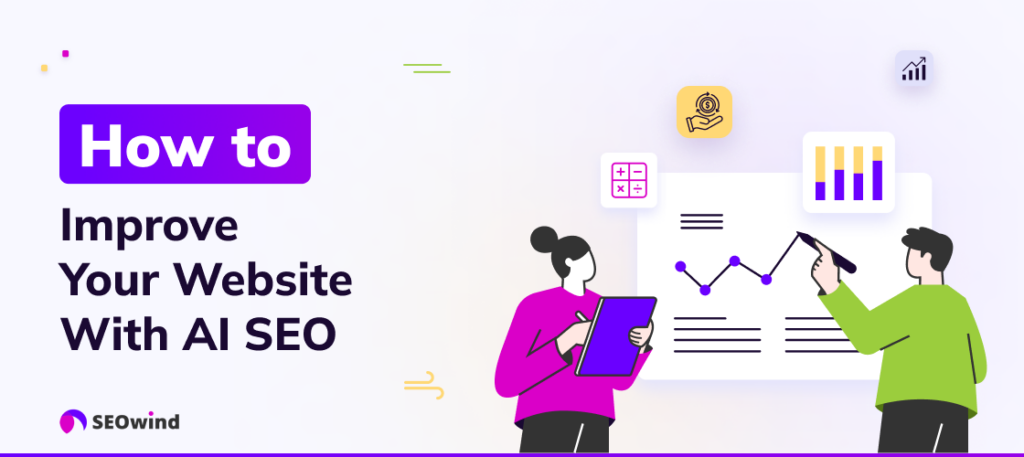
When implemented correctly, AI SEO can profoundly affect your online visibility and traffic growth. You can deploy several tactics to leverage the capabilities of Artificial Intelligence in optimizing your site’s SEO strategy.
1. Targeted Topics and Keywords
One of the most crucial aspects of search engine optimization is keyword research, where AI most clearly demonstrates its potential for boosting performance.
It does not merely involve finding every related keyword possible but also carefully selecting those relevant to your audience’s searches. Integrating an AI SEO strategy means deploying intelligent algorithms that instantly analyze hundreds or thousands of keywords related to your business niche.
Tools like SEOwind offer features that conduct in-depth content and keyword research while aligning with current SEO best practices. They help identify trends, supply user intent analysis and suggest semantically related keywords that occasionally go overlooked during manual keyword selection processes.
The Best AI Tools for Keyword Research
SEOwind tops the list here because of its ability to augment intelligent keyword research efficiency at scale. This makes it ideal for large companies or agencies managing multiple client websites simultaneously. Other tools worth considering include MarketMuse and the SEMRush Topic Research tool, which uses machine learning technology to generate fresh ideas incorporating top-ranked pages’ common themes.
2. AI Outlines and Briefs
After identifying targeted topics and keywords, it’s time to generate outlines that produce top-quality content. This is where another fantastic application of SEO Artificial Intelligence aids the construction of streamlined briefs designed to meet ranking requirements efficiently.
AI tools scan existing high-ranking articles for selected keywords, analyzing structure and context before crafting a detailed outline tailored to achieve optimal results. This reduces time investment while ensuring alignment with overarching marketing objectives.
The Best AI Tools for AI Outlines and Briefs
SEOwind has made significant strides in this area by providing digital marketers with profound insights into what makes well-structured content, from bulleted lists to pieced-together key points meant to drive more clarification. Another contender is Frase.io, which auto-generates detailed document outlines within a few minutes of inputting your target keyword.
3. Create SEO-Optimized Content
Creating high-quality content that drives traffic requires an intricate understanding of audience needs and search engine algorithms, which can be time-consuming.
AI tools can study top-ranking articles, find common traits that contribute to their success, and then advise on integrating such elements into your content. And the quality of content produced is often so impressive it feels like a highly skilled writer created it!
The Best AI Tools for SEO Content Creation
SEOwind has rightfully earned a spot as one of the best AI SEO tools. It allows users more in-depth keyword research and creates high-quality, long-form blog posts based on comprehensive analysis. SEOwind is followed closely by Jasper (formerly Jarvis).
4. Smarter Text and Voice Search
The evolution of voice technology heralds a significant shift in how users undertake web searches. Nowadays, Siri, Alexa, and Google Assistant are becoming common household names as more people utilize voice commands in their daily activities.
To ensure you’re not left behind, it’s crucial to adapt your website content for text and voice searches. Powered by natural language processing capabilities, AI can help your website comprehend typed and spoken user queries much better than before.
This comprehension enables you to anticipate user search behavior better by incorporating long-tail keywords and conversation phrases into your content strategy. As a result, you can provide answers precisely tailored to what your audience is asking.
The Best AI tools for text and voice search optimization
Harness the power of AI to optimize your site for text or voice searches with these top-notch tools:
- Jetson.AI – an advanced platform enabling businesses to sell products through any interface, including text messages.
- Voice SEOPro – geared towards optimizing websites for vocal search engines like Alexa.
- Dialogflow from Google – A developer tool that combines NLP with machine learning to understand conversational language.
5. AI for SEO at Scale
Scaling up SEO isn’t child’s play. It demands time-consuming data analysis processes such as keyword research and link-building activities. Fortunately, AI comes to the rescue yet again.
AI-powered SEO tools are designed to handle large amounts of data, analyze them faster, and provide actionable insights in a fraction of the time it would traditionally take. So, whether you want to identify high-performing keywords at scale or need assistance creating hundreds of personalized landing pages, AI has your back!
The Best AI Tools for SEO at Scale
Ready to scale your SEO efforts efficiently? Consider these game-changing platforms:
- Moz Pro – Packed with essential SEO features, including keyword research, link-building opportunities, and site audits.
- SEMrush – Offers an extensive suite of SEO tools covering areas from social media tracking to content marketing.
- SEOwind – This tool lets you create AI content at scale based on thorough content and keyword research.
6. AI for Technical SEO
Technical SEO comprises all activities intended to improve search engines’ understanding of a website. It maximizes website speed by minifying codes and optimizing images, ensures mobile-friendliness, and corrects 404 errors.
Artificial Intelligence is equipped with machine learning algorithms that can accurately diagnose technical issues within your site and recommend effective solutions.
The Best AI Tools for Technical SEO
Need help troubleshooting technical hitches impacting your SEO? Look no further than:
- Botify – Offers full-funnel organic search analytics that are ideal for diagnosing technical issues affecting visibility.
- DeepCrawl – An online crawler that finds and monitors technical issues influencing your site’s performance.
- PageSpeed Insights by Google – Provides real-time loading speed analysis plus suggestions for improvements using Lighthouse under the hood.
Now armed with this knowledge on effectively leveraging AI SEO strategy, you’re ready to dominate! Keep exploring further possibilities, as there’s more to unlock.
Implementing an AI SEO Strategy
Benefiting from the incredible power of Artificial Intelligence in SEO requires a strategic approach. This requires auditing your current performance, choosing the right AI tool, and designing an action plan to incorporate AI into existing practices.
Auditing Current SEO Performance With AI Tools
Before diving straight into implementing AI SEO tools, it’s essential to understand where you currently stand regarding Search Engine Optimization. This demonstrates where you need improvements or are performing optimally, serving as a basis for deploying AI technologies.
AI-powered auditing tools like SEMrush or Google’s Lighthouse are explicitly designed to evaluate the efficiency of your active SEO strategy. They dig deep into website load times, meta descriptions, and technical glitches that might impact your site’s visibility and user experience.
Rather than manually preparing tedious spreadsheets for data analysis, these integrated platforms offer comprehensive reports that highlight opportunities for enhancement while keeping tabs on benchmarks within your industry.
Selecting The Right AI Tools Based on Business Goals And Needs
Just as every business is unique, so are the goals and requirements they need for optimization when considering SEO and Artificial Intelligence integration. While numerous SEO AI tools exist in the marketplace, their suitability largely depends on specific business needs. Whether you aim to increase organic traffic, improve website ranking, or efficiently monitor competition activity determines what goes inside your toolbox.
Long-form content creators may find something like Frase beneficial for insights into ideal topics and keywords. Meanwhile, Surfer offers excellent scope for backlink and competitor research, which enhances off-site strategies.
It is essential to take the time to explore all these options, determine your primary business goals, and align them with an AI SEO tool.
Creating An Action Plan For Integrating AI into Existing SEO Strategies
Following the auditing process and selecting an appropriate SEO AI software that compliments your business objectives, you’ll need to integrate it seamlessly into your existing practices.
This begins by forming a committee led by key stakeholders within the organization to underline the strategic steps for deployment, encompassing both technical adjustments and the team training required for optimization. Conduct Proof of Concept trials before full implementation, as this helps predict future challenges while providing invaluable real-time learning opportunities.
Next, agile methods are beneficial in the gradual roll-out of AI technologies, thereby harmonizing with current processes rather than taking over abruptly and causing organization-wide havoc. Regular check-ins ensure things progress in line with defined frameworks.
Above all, remember that digital transition, especially when dealing with technological advancements, is rarely linear. As a result, patience and flexibility remain critical factors.
Measuring the success of AI SEO strategy
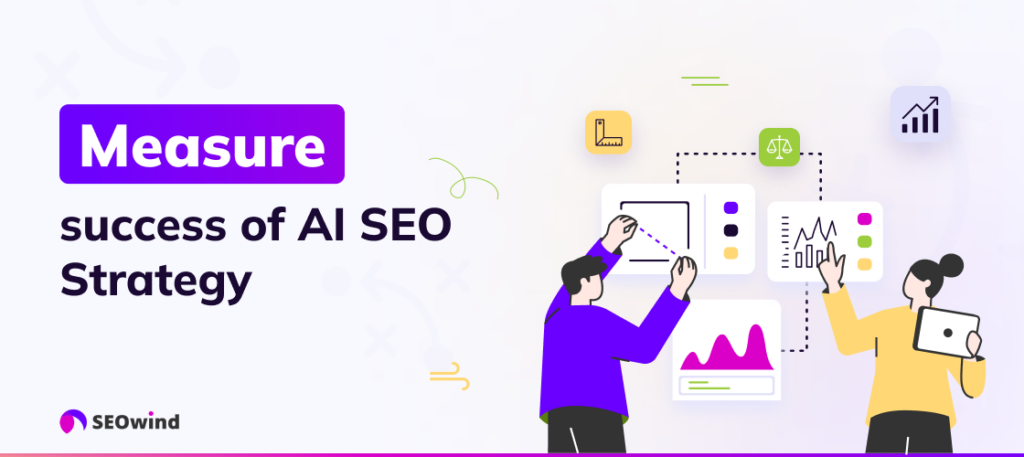
Any strategy’s foundation, whether traditional or AI-centric, is assessing its performance. Let’s go through critical metrics to look at.
Key metrics to track when evaluating the effectiveness of AI SEO implementation
To turn the tide in our favor, we need to exploit data-focused decision-making instead of relying on gut feelings. The math is easier than you might imagine. You merely have to focus your attention on a few key ingredients:
- Organic Traffic: A substantial growth in organic traffic would imply that your AI-powered SEO strategies are bearing fruit.
- Page Rank: Is your page climbing up search engine results? If so, commend your Artificial Intelligence SEO efforts.
- Time Spent on Page: The more engaging your content, the longer visitors might stay and the lower your bounce rates.
- Click-Through Rate (CTR): Take note if whether there’s an increase in click-through rate after leveraging AI for SEO optimization.
- Backlinks: AI content optimization can attract numerous natural backlinks if done right.
- Conversion Rate: Track visitor-to-customer conversion rate. A higher rate means you’re winning the battle with your AI SEO toolkit.
These indicators reflect your strategy’s success and empower you with insights for future action plans.
Analyzing data and making adjustments to optimize results
After monitoring these factors diligently using various best AI SEO tools, dive deep into these datasets to unearth valuable insights. For example, detect which keywords elevate your organic traffic.
Allow the raw numbers to tell you a story where you should focus. Use Artificial Intelligence in SEO to optimize and adjust strategies on the fly. After all, film directors often shoot multiple takes before landing on the one that captures the magic.
The key is not merely implementing an AI strategy but iterating it based on real-time findings.
How SEO will Change with AI?
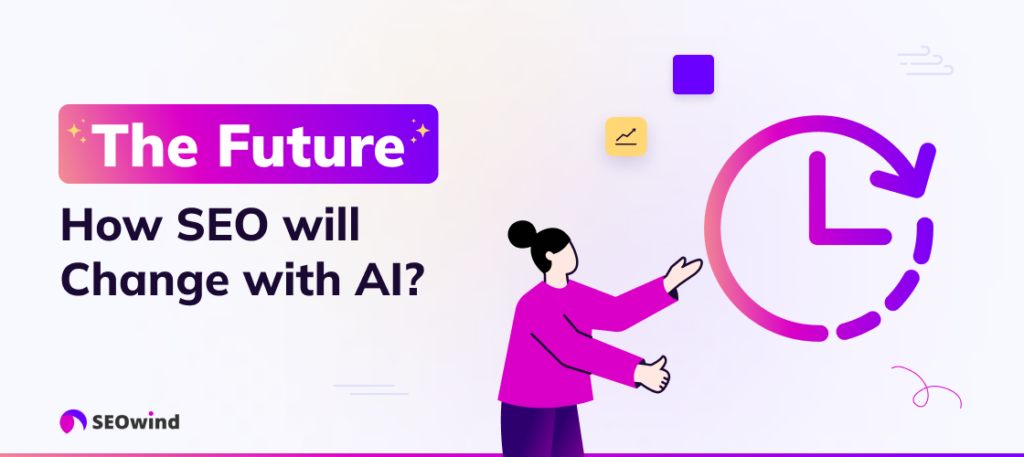
With the advent of Artificial Intelligence, we’re witnessing a new era of algorithm sophistication. Let’s dig into how the dynamic relationship between AI and SEO promises to reshape search engine optimization.
Traditionally, SEO was all about understanding algorithms. Marketing professionals would spend countless hours unraveling Google’s game plan by optimizing keywords, developing backlinks, and creating compelling, user-focused content. However, with the incorporation of Artificial Intelligence in SEO strategies, these algorithms might soon understand us.
Artificial Intelligence has long been lauded for its problem-solving prowess and accuracy in predicting outcomes based on past data. As AI enters SEO, it delivers profound changes that will redefine our current practices:
- User Experience to Take Center Stage: AI strives to make search engines more intuitive by understanding user queries better. It isn’t just about stuffing your content with keywords. Instead, search engines will prioritize websites that offer valuable information relevant to what a user is searching for.
- Relevance Over Keyword Density: While keywords retain significance in SEO strategies, AI will focus more on context over keyword density, at which point the overall theme or subject matter becomes paramount.
- AI-powered Voice Search: With most households owning at least one smart speaker and everyone having access to Siri or Alexa on their phones, voice search will dominate future trends. Consequently, optimizing content for voice searches will become an essential part of an effective SEO strategy.
- Real-time UX Optimization: Using machine learning and real-time analytics tools for SEO optimization can help organizations provide personalized experiences to users at scale.
The picture I am trying to paint suggests that this paradigm shift shouldn’t intimidate but motivate you to embrace these imminent changes wholeheartedly! The constantly evolving technological landscape demands adaptability and resilience, characteristics inherent to any thriving business. By incorporating AI into your SEO game plan, you can supercharge your website’s visibility, drive more traffic, and secure an undisputed competitive advantage in the digital market.
Remember: “Change is the only constant.” As AI redefines traditional SEO tactics, it’s crucial to stay ahead of the curve and start rethinking how to leverage Artificial Intelligence for optimal SEO performance.
Encouraging Businesses to Embrace AI for Better Search Engine Optimization
More than just a buzzword, Artificial Intelligence is swiftly becoming a cornerstone of successful digital marketing strategies. In search engine optimization, harnessing the power of AI can provide significant advantages.
Admittedly, the leap to machine learning and automated SEO platforms might be intimidating. But it’s essential for businesses that want to overwhelm their competition on today’s digital stage.
Understanding the Core Value
Firstly, it’s crucial to understand how businesses can benefit from integrating an AI SEO strategy. Incorporating AI tools for SEO optimization enables more efficiency and precision, primarily through predictive modeling and automation. Organizing monotonous tasks like keyword research or managing metadata becomes swift and painless, freeing valuable time for more complex duties. Measuring return on investment also becomes quicker with real-time SEO intelligence produced by these advanced tools.
Moreover, AI empowers better targeting with its ability to analyze vast amounts of data at unprecedented speed. This enhanced analysis leads to improved personalization, boosting the user experience.
Overcoming Operational Hurdles
Despite the evident value of Artificial Intelligence in SEO, some apprehensions may discourage companies from leveraging this technology. However, addressing these fears head-on will help businesses realize the true potential of this advanced approach without hindrance.
Fear not! Implementing Artificial Intelligence doesn’t necessarily mean discarding existing processes or letting go of control over your content strategy. Instead, treating AI as a supportive assistant that works within current frameworks helps embrace this technological advancement without dramatic operational changes or unexpected hazards.
In essence, selecting and implementing AI-based solutions requires careful consideration. Yet, it doesn’t require extraordinary technical skills because many providers offer comprehensive support during implementation.
Onwards to Enhanced Growth
Embracing AI is vital to growing your business or even maintaining competitive relevance. While SEO Artificial Intelligence may appear complex initially, armed with awareness and a strategic implementation plan, companies can successfully integrate these powerful tools for enhanced results.
So, why wait? Join the journey toward an AI-powered SEO strategy.
Frequently asked questions about AI SEO
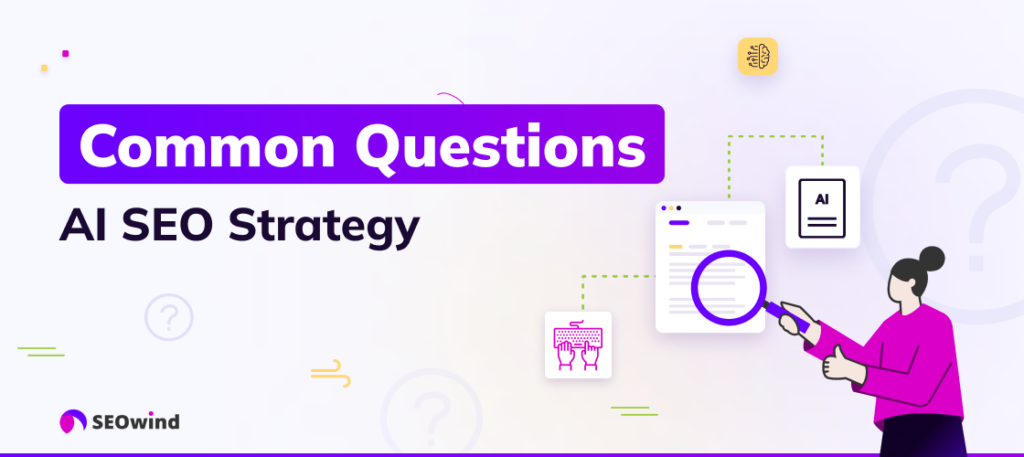
Let’s dive into some of the most frequently asked questions about AI SEO.
How do I make AI content SEO-friendly?
Like traditional content, you can optimize your AI-generated content for search engines. Here are some quick steps:
- Target – Use AI tools to generate a list of relevant and trending keywords closely related to the topic of your content.
- Integrate – Seamlessly embed these keywords within your content without overstuffing.
- Structure Correctly – Ensure that your AI content follows good practices, such as having clear headings and subheadings (H1, H2, etc.), bullet points where necessary, and logical paragraph breaks.
- Boost the User Experience – Pay attention to factors like readability and page speed, which contribute significantly towards making your content more SEO-friendly.
Remember that content is king, but even an excellent piece might get obscured if not optimized correctly!
What is the difference between traditional SEO and AI SEO?
Traditional SEO revolves around manual efforts in keyword research, link-building activities, meta optimization, and more. Although effective if executed well, these processes can be labor-intensive.
Enter Artificial Intelligence. With advancements in machine learning in SEO and tools utilizing analytics data at scale, AI has impacted how these tasks are completed today.
The key differences lie in efficiency and predictability. AI allows us to expedite repetitive tasks. It also gives us insights through in-depth data analysis – something impractical for humans due to the enormity of internet data.
Will AI take over SEO?
As of now, we cannot definitively predict whether Artificial Intelligence will completely take over SEO. While AI has made significant strides in automating and improving various SEO aspects, it can’t completely replace a human’s creative and strategic ability.
Yes, Artificial Intelligence in SEO is transforming how we identify opportunities for website improvement, making changes based on robust data collection, and even optimizing content performance with predictive modeling. However, individuals who strategize, troubleshoot issues, and build relationships for link-building still operate these tools.
A blend of AI-powered SEO tools and strategy driven by skilled humans is currently the most effective approach.
Will AI replace SEO jobs in the future?
While AI improves efficiency in tasks like data analysis or identifying patterns across vast datasets, creative thinking, emotional understanding, and relationship building are also fundamentals of any successful SEO strategy and beyond the technology’s current capabilities.
The rise of machine learning and Artificial Intelligence will likely change the focus of those roles and increase productivity. Instead of perceiving AI as a threat, this should be seen as an opportunity to integrate AI for better outcomes while focusing more on strategic decisions.
What are some challenges in implementing an AI SEO strategy?
Implementing an AI SEO strategy isn’t without potential challenges, from needing clear business goals to technical implementation roadblocks:
- Understanding Complex Tools: Many advanced AI SEO tools require technical expertise to be set up and used effectively.
- Data Protection Concerns: You’ll be dealing with large amounts of user data processed by these tools, which poses concerns about GDPR compliance.
- Unclear Goals or Strategy: Just having access to a powerful AI SEO tool will only help if you’ve clearly defined what you seek to achieve with it.
- Budget Constraints: Robust Artificial Intelligence-powered tools may come at a higher cost than traditional ones. Planning resources becomes paramount.
Remember, challenges are simply hurdles to leap over as you race toward your SEO goals with AI at your side!
